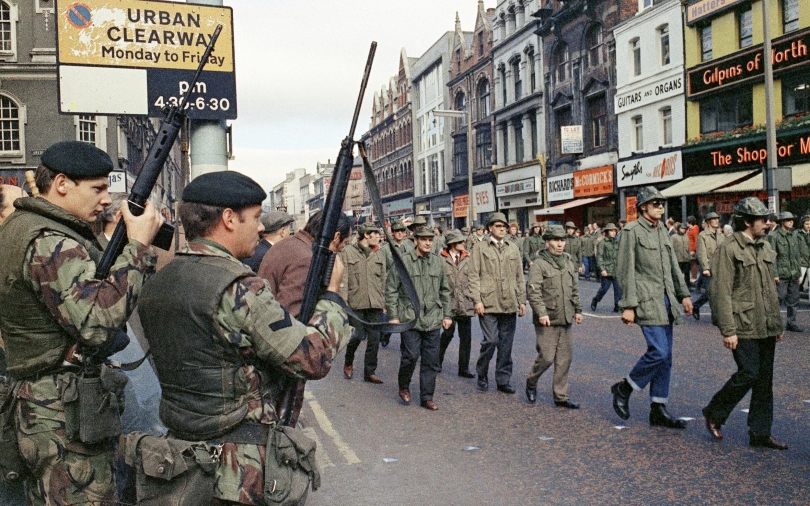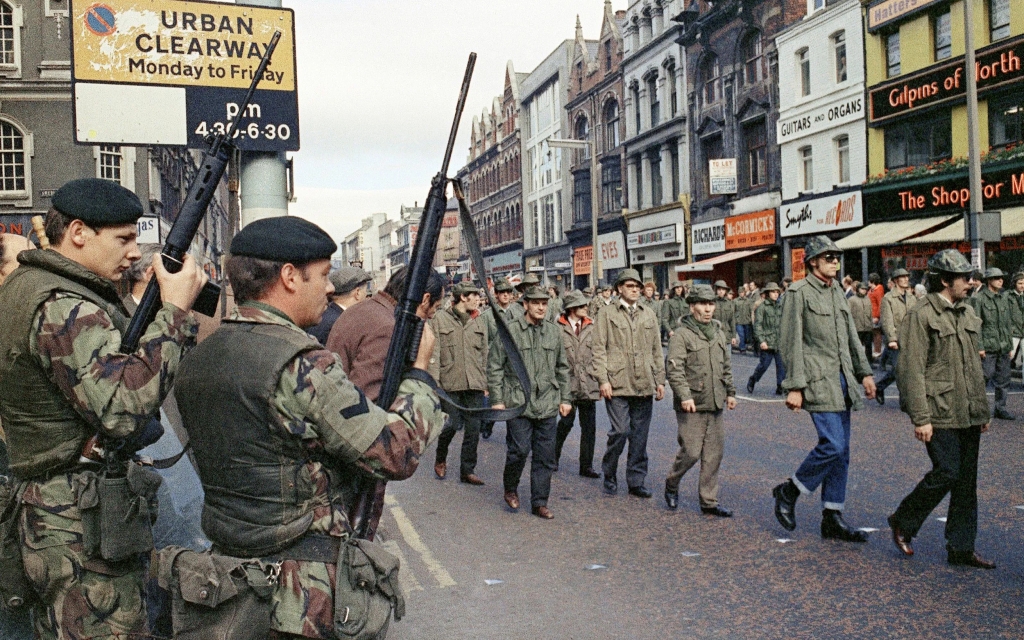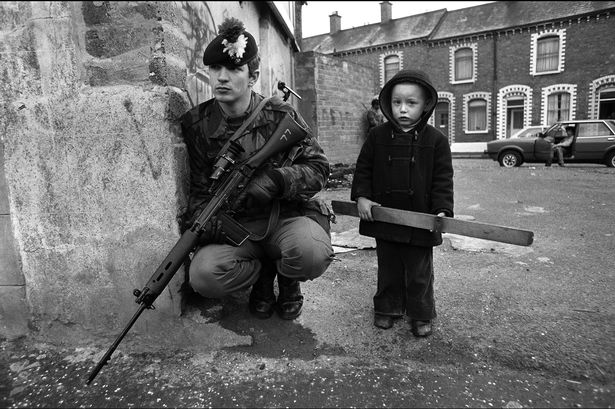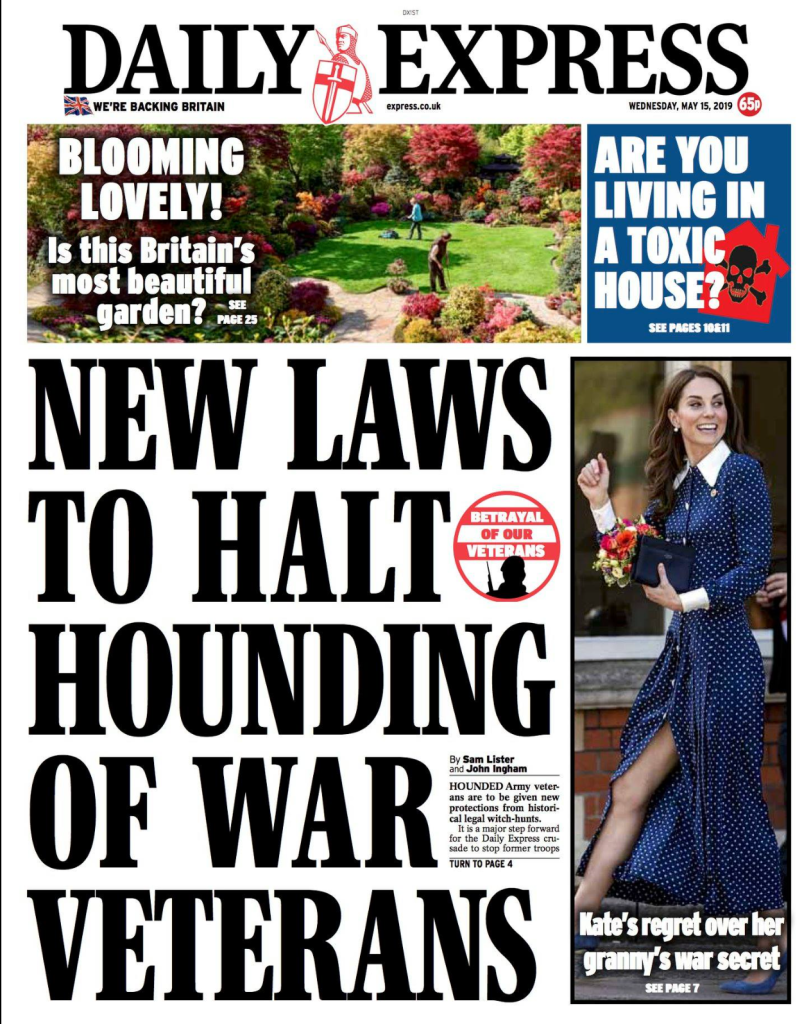Between British troop deployments in 1969 and the Good Friday Agreement of 1998, the Northern Ireland conflict cost in excess of 3,600 lives. More than 1,000 of these killings remain unsolved. In 2017, a report by the Northern Ireland Victims and Survivors Commission found that 26 percent of the adult population identified as victims, due to injury and harm experienced personally or through bereavement. Now undergoing its final review in the House of Commons, the Northern Ireland Troubles (Legacy and Reconciliation) Bill proposes to transform how Northern Ireland deals with the conflict’s entangled legacies.
The current protocols for addressing this painful past stem from the Stormont House Agreement (SHA), signed in 2014 by Northern Ireland’s political parties and supported by the British and Irish governments. After nearly three months of negotiations, the SHA established several interlocking mechanisms to address legacy issues. Crucially, an Historical Investigations Unit – overseen by the Northern Ireland Policing Board – was set up to pursue criminal investigations into conflict-related deaths. Meanwhile, an Independent Commission for Information Retrieval enabled families privately to seek information about the deaths of their loved ones. Supported by all major parties in Northern Ireland except for the Ulster Unionist Party, the SHA was founded upon the principle of ‘upholding the rule of law’.
Although the UK government pledged up to £150 million to fund the SHA’s initiatives for five years, there were recurring problems with their implementation. For ten weeks in 2015, representatives of the British and Irish governments joined the parties in Northern Ireland’s devolved executive to establish their policy priorities. The so-called ‘Fresh Start’ talks agreed fiscal reforms for the devolved assembly, but lapsed without establishing a legislative framework for dealing with the past.
During the ensuing impasse, in 2018, Karen Bradley, Secretary of State for Northern Ireland, coordinated a public consultation on legacy issues. More than 17,000 citizens wrote to Bradley’s office, expressing their views on the way the history of conflict should be presented to future generations, and how to expedite post-conflict reconciliation. Most respondents declared ‘broad support’ for the SHA framework for pursuing prosecutions, indicating a clear preference for resolutions consonant with ‘the rule of law’ and ‘the needs of victims and survivors’. The British government’s review of the consultation held that ‘almost all respondents agreed that any approach to dealing with the past should be victim-centred’: the government insisted that it remained ‘fully committed’ to implementing the SHA.
However, despite the Historical Enquiries Team’s (HET) £30 million annual budget, the pursuit of prosecutions yielded limited results. Over a ten-year period, just three of the 1,615 cases reviewed by the HET resulted in murder convictions. Between 2015 and 2021, only nine people were charged in connection with Troubles-related deaths, and just one person was convicted.
The new Legacy Bill represents a profound change of tack, from pursuing prosecutions to offering de facto amnesties. The legislation will create a new truth recovery body called the Independent Commission for Reconciliation and Information Recovery (ICRIC). Most contentiously, the ICRIC will be empowered to grant immunity from prosecution for perpetrators and ex-combatants who cooperate. Provided that they provide information ‘true to the best of [their] knowledge and belief’, republicans, loyalists, and British service personnel alike can access an effective amnesty. When the ICRIC becomes operational in May 2024, legacy inquests and investigations will cease. As such, the Bill threatens some twenty inquest cases currently awaiting a court date.
The Legacy Bill has occasioned extraordinary unanimity across Northern Ireland’s divided political realm. Since the Bill was formulated in 2021, its proposals have united in opposition victims’ and survivors’ groups, as well as parties across Northern Ireland’s political spectrum. Aside from its Conservative sponsors at Westminster and British Army veterans’ organisations, the Bill has proved universally unpopular. On the Opposition benches at Westminster, where Labour has opposed the Bill outright, Keir Starmer has indicated that a Labour government would repeal the legislation. Leo Varadkar and Micheál Martin, the Irish Taoiseach and Tanáiste respectively, have been scathing in their criticism of [EM1] the Bill and reiterated their commitment to the SHA model. International human rights organisations have joined the chorus of opposition. Fabián Salvioli, United Nations Special Rapporteur on the promotion of truth, justice, and reparations, and Gráinne Teggart, Amnesty International’s Northern Ireland Deputy Director, have insisted that the Bill breaches the state’s obligation to investigate serious human rights violations.
Across Northern Ireland’s divided society, there is no consensus on the causes and character of the conflict. For unionists, the Troubles represented a despicable republican ‘terrorist’ campaign; for nationalists and republicans, the conflict was the inevitable product of ‘undemocratic’ partition and of British rule in the north. Meanwhile, survivors and the bereaved indict paramilitaries and state forces tout court for perpetuating a conflict in which the majority of victims were civilians. But while interpretations of the conflict differ profoundly in Northern Ireland, there is widespread agreement that its difficult legacies remain to be addressed. Each political community has unresolved grievances. Unionists seethe as republican ‘terrorists’ released early from jail enter political office. Nationalists and republicans accuse state forces of whitewashing their deadly collusion with loyalist paramilitaries. Closing judicial routes to dealing with the past, the Legacy Bill unifies Northern Ireland’s political spectrum in opposition.
Legislation has rarely precipitated such a consensus of public and political opinion in Northern Ireland. On the one hand, unionists vehemently oppose a Bill which offers amnesties to the republican ‘terrorists’ responsible for 60 percent of deaths during the conflict. Democratic Unionist Party MP Carla Lockhart, for example, has castigated the ‘immoral’ and ‘unjust’ Bill which would ‘protect’ terrorists. Simultaneously, nationalists abhor a Bill which curtails judicial proceedings against former British service personnel, and prevents civil inquiries into claims of lethal collusion between the security forces and loyalist paramilitaries. Sinn Féin MP John Finucane – whose father, Pat Finucane, was murdered by loyalists in 1989 – alleges that the Conservatives have backed the ‘cruel and callous’ legislation to conceal the British Army’s record in Northern Ireland. Republicans regard the proposals as a case of the British state designing legislative cover for historical human rights abuses. After decades of judicial campaigning by determined activists, last month the Police Service of Northern Ireland (PSNI) formally apologised to ‘the hooded men’ – fourteen Catholics interned in 1971 – for torture under interrogation by state forces. Victims’ and survivors’ groups have also repudiated a Bill which would prevent perpetrators of all political stripes being brought to justice. The decision of the present Secretary of State, Chris Heaton-Harris, to appoint Sir Declan Morgan to chair the ICRIC – even before the requisite legislation was passed to create the commission – has raised further hackles.
For their part, the Bill’s Conservative backers primarily expound pragmatism, arguing that pursuing prosecutions more than half a century since the conflict erupted is simply impractical. The Command Paper which precipitated the Legacy Bill in 2021 arraigned the SHA as an ineffective mechanism which failed victims and survivors: ‘More than two thirds of deaths from The Troubles occurred more than 40 years ago… The prospect of successful criminal justice outcomes is vanishingly small… The divisive cycle of criminal investigations and prosecutions… is not working for anyone and has kept Northern Ireland hamstrung by its past’. The Legacy Bill’s most prominent parliamentary supporters, such as the military veterans Sir Iain Duncan Smith and Johnny Mercer, also highlight the SHA framework’s suboptimal outcomes.
Promoting the Bill also reflects the embattled Conservative government’s desire for a rapprochement with military veterans and their supporters. Founded in 2015 to pressure the authorities to ‘stop the prosecutions’, the Northern Ireland Veterans Movement (NIVM) identified the Tory government as its ‘main enemy’. The Conservatives’ general election manifesto in 2019 pledged to ‘tackle the vexatious legal claims that undermine our Armed Forces’ and to ‘give veterans the protections they deserve’. Introducing the Bill in the Commons in 2022, then-Secretary of State Brandon Lewis explicitly underlined how the legislation honoured that promise.
British military personnel killed at least 150 unarmed civilians during the conflict, yet only six former soldiers who served in Northern Ireland have been prosecuted. The four soldiers convicted of murder were the subject of high-profile campaigns in Britain demanding their release: all four were freed on licence within three years, and allowed to rejoin the Army. These few cases have nonetheless garnered significant media attention and political controversy. Perceptions of a ‘witch hunt’ have impelled Army veterans to back the Bill to curtail criminal proceedings against ex-soldiers. The case of the late Dennis Hutchings became something of a cause célèbre. In October 2021, Hutchings, an 80-year-old former Corporal, died while standing trial on charges pertaining to the death of John Pat Cunningham, a young man with learning disabilities who was shot in the back while running from an Army patrol in County Tyrone in 1974. Reflecting on the case, prominent veterans’ activist Robin Horsfall said that Hutchings was a ‘hero’ who had been failed by the state that he served.
In November 2022, in an equally well-documented case, David Holden was convicted of the manslaughter by gross negligence of 23-year-old Aidan McAnespie. McAnespie was shot in the back as he crossed a border checkpoint in February 1988. Holden, who was serving with the Grenadier Guards, was found to have fired the fatal shot. Commenting after the verdict, Paul Young, national spokesperson for the NIVM, told reporters that the ruling was part of a ‘witch hunt’ against former service personnel: ‘That’s why we support the Legacy Bill that is going through parliament now which will stop any further prosecutions of veterans that have previously been investigated’.
But without political support beyond an enfeebled Conservative Party, and devoid of popular legitimacy, the Legacy Bill will pass parliament but remain incapable of functioning. Its operational prospects rest heavily upon a spirit of voluntarism, yet without public confidence and the institutional support of political parties, human rights organisations, and victims’ groups, the new truth recovery mechanism is unlikely to persuade ex-combatants to engage. The authoritative Belfast journalist Allison Morris reports that representatives of all but one of Northern Ireland’s paramilitary groups have already ruled out cooperating. In any case, the incentive for ex-combatants to seek immunity from prosecution is marginal at best: the Northern Ireland (Sentences) Act of 1998 already established a maximum prison term of just two years for Troubles-related offences.
The problems facing the Bill are both political and practical. Legal experts from the Model Bill team at Queen’s University Belfast and the Committee on the Administration of Justice have suggested that in its current form the Bill fails to comply with the European Convention on Human Rights (ECHR)’s Article 2 on the right to life. As Anna Bryson and Kieran McEvoy have shown, the ECHR allows for amnesties only where they are demonstrably ‘necessary’, and where they comply with victims’ rights to access truth recovery and reparations.
The controversy surrounding the Bill has illuminated once again among the British public the remarkable degree of indifference towards Northern Ireland’s fate. On the one hand, British responses to the Legacy Bill indicate residual defensive loyalty to the British Army’s record in Northern Ireland. Successive governments’ political justifications for military deployment from 1969 – ostensibly to keep apart two warring factions in Ulster – continually resonate with a significant proportion of the British electorate. When Hutchings and Holden faced criminal charges, right-wing tabloids led popular campaigns against the ‘witch hunts’. From 2018, the Daily Express fulminated against the ‘betrayal of our veterans’, who were ‘hounded’ over ‘Troubles-related killings’. By July 2022, Conservative leadership contenders Rishi Sunak and Liz Truss – both would serve as Prime Minister within three months – signed the Sun’s ‘veterans’ pledge’, vowing to support ‘our boys’ and to ‘end the witch hunts’. ‘It is absolutely right to support the men and women who have honourably served their queen and country’, said Truss. ‘As Prime Minister, I will make sure they are protected from being prosecuted for historic allegations and ensure that no new evidence can be brought towards them in court’.
There is certainly support in Britain for Holden, Hutchings, and their comrades. But such sympathy for ‘our boys’ does not necessarily mean enthusiasm for the union, less still a positive orientation towards Northern Ireland. A YouGov survey of 1,700 British voters in March 2020 found that only 37 percent of respondents thought that Northern Ireland should remain part of the UK, and some 54 percent said that they did not care whether Northern Ireland left the union. Even among Conservative voters, whose party officially maintains the ‘unionist’ moniker, there is major indifference where Northern Ireland is concerned: only 47 percent of Tory supporters said that the union should continue.
Given the Bill’s abject unpopularity across Northern Ireland, it is unlikely that its institutions can function, less still that they can deliver a robust mechanism for dealing with such a difficult past. The Irish government has also recently indicated that it will consider interstate legal action against the legislation, meaning that protracted disputes in the European Court of Human Rights could yet follow. The present Bill therefore risks becoming a dead letter, further delaying progress with the difficult legacy issues which have bedevilled a stalling peace process.
Jack Hepworth is Canon Murray Fellow in Irish History at St Catherine’s College, Oxford.




